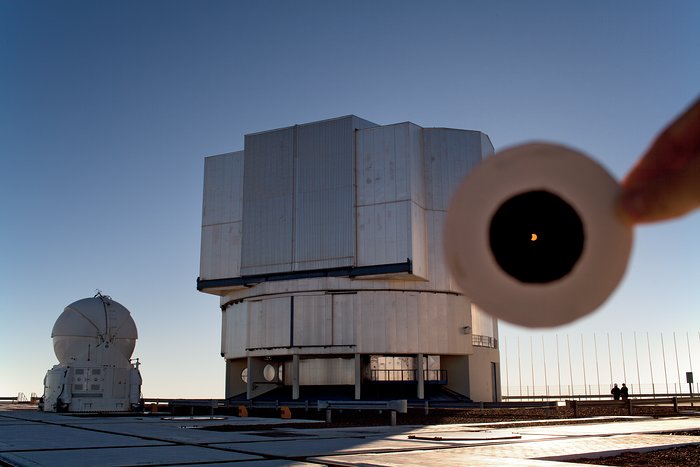Eclipse parcial de Sol sobre el VLT
Ayer 11 de Julio de 2010, entre las 14:15 y las 16:51 (Chile continental), la sombra del eclipse total de Sol cruzó el Océano Pacífico tocando a su paso varias islas pequeñas, incluyendo Tuamotu en la Polinesia Francesa, Mangaia en las Islas Cook y la Isla de Pascua en Chile. El eclipse total rozó el sur del territorio continental chileno y pudo ser observado como un eclipse parcial en el resto del país.
En Chile continental, fuera de la zona de completa obscuridad, el eclipse parcial fue visible desde el Observatorio Paranal de ESO. Allí, el “embajador fotográfico” de ESO Yuri Beletsky obtuvo esta imagen cerca del punto medio del eclipse.
A simple vista, los eclipses son difíciles –y peligrosos– de mirar hasta que alcanzan su punto máximo, debido al intenso brillo del Sol. Sin embargo, con un filtro es posible reducir el brillo y revelar el avance del disco de la Luna a medida que va cubriendo la superficie del Sol. En esta imagen el filtro es sostenido a mano entre el lente de la cámara y el Sol, permitiendo observar la característica forma de mordida en el lado izquierdo del Sol. Alrededor se aprecia el espectacular emplazamiento del Very Large Telescope de Paranal.
Además del personal de ESO que observó el eclipse parcial desde Paranal, un pequeño grupo de entusiastas astrofotógrafos de ESO, incluyendo miembros del Departamento de Educación y Difusión de ESO, pasaron sus vacaciones en la Isla de Pascua para presenciar el eclipse total. Entre ellos estuvo el “embajador fotográfico” de ESO Stéphane Guisard.
Enlaces
- Información adicional sobre el eclipse del 11 de Julio
- Imágenes del eclipse obtenidas por Stéphane Guisar serán publicadas en: http://www.astrosurf.com/sguisard/
ESO/Y. Beletsky
Sobre la imagen
| Identificador: | potw1028a |
| Idioma: | es-cl |
| Tipo: | Fotográfico |
| Fecha de publicación: | 12 de Julio de 2010 a las 10:25 |
| Tamaño: | 3500 x 2333 px |
Sobre el objeto
| Nombre: | Very Large Telescope |
| Tipo: | Unspecified : Technology : Observatory : Telescope |
